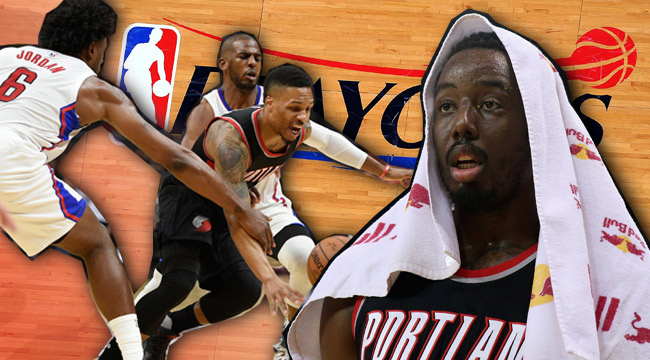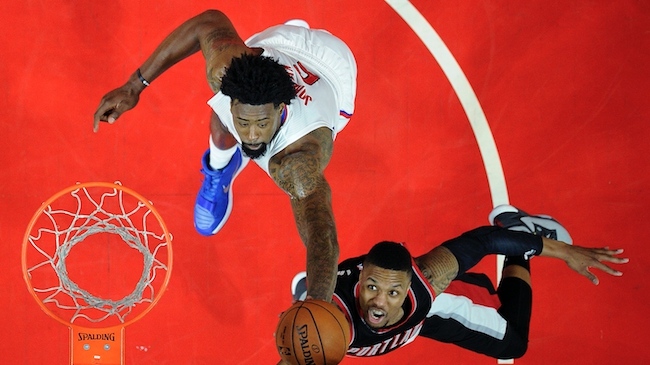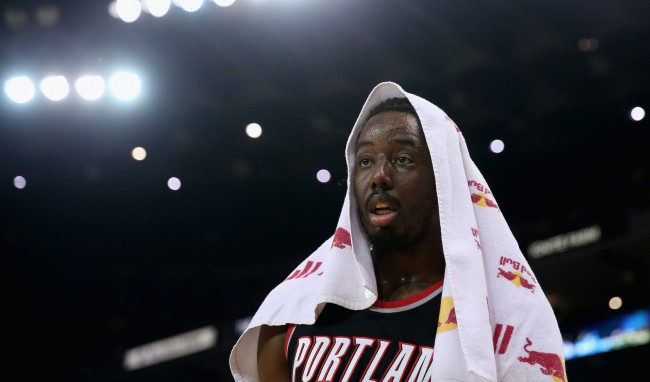
It’s important to remember that the Portland Trail Blazers weren’t built to be here.
Neil Olshey didn’t resort to full-blown tank mode after it became apparent LaMarcus Aldridge would leave the lush Pacific Northwest for greener basketball pastures. The Blazers agreed to a team-friendly deal with Al-Farouq Aminu just shortly after the clock struck midnight on July 1, nabbed Ed Davis under similar terms a couple days later, and even traded a late first-round pick for Mason Plumlee before free agency began.
Portland’s path to rebuilding was different than the Philadelphia 76ers’, basically, yet still marked by the same ethos: Step back now to leap forward later. Anyone in the organization who ever suggested otherwise was lying. The Blazers had no realistic ambitions of a playoff appearance when the season tipped off in late October, which is exactly why Terry Stotts’ team appeared so painfully overmatched in Game 1 of its first-round series against the Los Angeles Clippers.
Damian Lillard is a full-fledged star and CJ McCollum one of the game’s brightest young playmaking guards. Beyond their live-wire backcourt, though, the Blazers lack any player who’s ready to fill the role he’s suddenly been thrust into occupying on the postseason stage.
Doc Rivers and company understand the limits of Portland’s barely-evolved roster, and exploited them to supreme advantage in an impressive 115-95 victory on Sunday night at Staples Center. How? By forcing anyone other than Lillard and McCollum to beat them.

Los Angeles’ normal pick-and-roll coverage asks for DeAndre Jordan and his fellow big men to drop back when their defenders set screens on the ball, corralling playmakers into increasingly cheap real estate between the arc and the paint. But facing basketball’s most fearsome pair of long-range shooters outside the Bay Area, the Clippers reverted to defensive schemes of the past, blitzing pick-and-rolls and trapping ball handlers at the point of attack.
The result? Lillard and McCollum combined for just 30 points on 10-of-28 from the field, while the Blazers’ ancillary pieces consistently failed to connect on wide-open jumpers and make plays out of 4-on-3 situations gleaned from Los Angeles’ hyper aggression.
The ineffectiveness of Portland’s supporting cast shouldn’t necessarily be a surprise. Aminu is still most comfortable as a finisher despite his improvement from beyond the arc. Plumlee and Davis can’t score outside 5 feet. Allen Crabbe is uncomfortable attacking the rim off the bounce. Mo Harkless and Gerald Henderson make their marks with defense and energy, while Noah Vonleh just isn’t quite ready to contribute with the stakes this high.
None of that’s new. A lack of peripheral offensive dynamism plagued the Blazers throughout the regular season. The difference between now and the past six months, however, is the Clippers had time to magnify that weakness with pitch-perfect game planning – and the talent necessary to implement it.
Jordan was an absolute monster in Game 1. When he wasn’t sealing an overmatched defender in the restricted area for an easy basket, he was wreaking havoc on the other end by making the more subtle defensive plays he couldn’t with regularity until this season.
Just where is McCollum supposed to go with the ball here? Jordan cuts off his dribble some 40 feet from the basket with a superb angle on the trap, then prevents a pass over the top to Plumlee by retreating with high hands.
https://i.giphy.com/ceRBuAc6jMJyw.gif
Maybe most indicative of Jordan’s impact? Plumlee has the chance to set another ball screen once McCollum catches in the right corner, but elects to let his teammate isolate against Luc Richard Mbah a Moute instead – a choice that led to a running, off-balance leaner that caromed off the other side of the rim.
Time and again Sunday night, the Blazers’ guards just couldn’t free themselves from Jordan in pick-and-roll play. Los Angeles’ giant jumping jack was always there to thwart the initial action, and right there moments later to ensure Lillard and McCollum couldn’t get a clean look on second effort, too.
https://i.giphy.com/CRBfucyiXGh0s.gif
And during the rare occasions the Blazers’ starting backcourt found a way to attack Jordan on a switch, he more than held his own.
https://i.giphy.com/KsaglN7iPGdAQ.gif
Still, it wasn’t just missed shots by Lillard and McCollum that doomed Portland. Missed opportunities by their teammates did the Blazers in too, and Aminu was the biggest culprit.
The 25 year-old forward went three of 12 overall and two of eight from three-point range in Game 1. All but two of his attempts came outside the paint and he connected on just a pair of nine uncontested shots – a staggering number the Clippers were happy to give him.
Aminu missed easy jumpers after a guard and big man completed the arduous task of beating Los Angeles’ ball-screen defense.
https://i.giphy.com/e5rwbiO2L8xva.gif
He missed open shots after setting double drag screens for Lillard.
https://i.giphy.com/9PCAPY8FRra24.gif
He couldn’t hit makable tries after “shorting” the pick-and-roll.
https://i.giphy.com/1ahbYFY23nOPC.gif
And perhaps worst, Aminu failed to adjust and stuck with his broken jumper even when a better shot was available elsewhere.
An underdog like Portland can’t afford to opt for good looks when great ones are available – especially when the latter would come from Lillard and McCollum, who are being checked by the Clippers’ best perimeter defenders while drawing the attention of every other player in red, white and blue on the floor.
In the still below, Aminu had just caught a pass from Lillard as Los Angeles scrambled to recover to primary defensive assignments. JJ Redick had to tag Plumlee on the roll to prevent a dunk, leaving Harkless all alone in the right corner. But Aminu decides to launch another three instead of swinging the ball to an open shooter in the short corner.
After the game, Aminu said the Clippers’ willingness to leave him open yielded bewilderment that led to his poor shooting night. And if they continue that strategy going forward, the sixth-year veteran insists he’ll continue trying to shoot the defense out of it.
“It was kind of crazy, I think that’s what kind of messed me up mentally,” Aminu told Forward Center’s Casey Holdahl of Los Angeles’ defensive approach. “Usually people try to run me off the line a little more. I just hope that keeps on being the same.”
Here’s the problem for Portland: The Clippers will ensure Aminu and the rest of his role-playing teammates will be forced to make plays as this series continues. The electric ability of Lillard and McCollum, Rivers has decided, won’t be what sends his team home with a first-round loss. If Los Angeles loses to the Trail Blazers, it will be because guys like Aminu produce offense in ways they never have in the NBA.

Some teams are good enough to render the Clippers’ strategy inadequate. Think back to the Golden State Warriors breaking the Finals open after Steve Kerr adjusted his lineup to account for the Cleveland Cavaliers’ focus on Steph Curry.
But Portland doesn’t have an Andre Iguodala, Shaun Livingston, Harrison Barnes, and certainly not a Draymond Green. This team’s complementary pieces aren’t close to the quality of Golden State’s – which is totally, totally fine in the big picture. Aminu and the rest have either just begun to enter their prime or remain basketball babies. McCollum is only in his third season, and even Lillard has yet to reach the status of NBA veteran.
The Blazers aren’t supposed to be in the playoffs, fighting like hell to compete against a Clippers team so long on postseason experience that it be championship or bust. And while that’s likely to remain a painful reality for Portland and its loyal fan base over the next few games, it’s also a reminder of just how far this franchise has come less than one year removed since starting from scratch.






